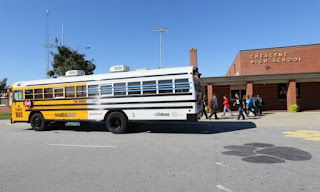Prison Talk
We firmly believe that even though a prisoner's body is locked up, their mind can always be free to travel the world and learn about anything they are interested through the magic or books.
Thursday, October 18, 2012
Bus a vehicle to urge students to choose school, not prison
IVA — A school bus of a different stripe idled in front of Crescent High School on Tuesday.
The first half looked like a typical yellow school bus. But the rest was painted a dull white, the color of prison buses in Alabama.
Inside, eight 11th-grade girls sat listening to Chet Pennock tell them why they need to stay in school.
Reason No. 1 is to avoid prison.
At the back of the bus, the girls walked inside an 8-foot by 8-foot replica of a cell that held a metal bunk bed, toilet and water fountain once used by prisoners in Holman Correctional Facility in Atmore, Ala.
Some of the students whispered. Others said nothing and stared blankly at a schedule posted on the wall. Wake-up time at most prisons is 3:30 a.m. Work begins at 7 a.m. Lights must be out at 10:30 p.m. “No cellphones, no iPods, no video games, no curling irons, no hair products,” Pennock said. “A typical cell this size will almost always have four people, all out in the open to see, hear and smell the things we do in private.”
Pennock is a lead presenter with the Mattie C. Stewart Foundation based in Birmingham, Ala. The nonprofit drives its Choice Buses to middle schools and high schools across the nation to reduce the dropout rate. The message is simple, and tangible: Stay in school or you could go to jail.
Before students walk into the jail cell the bars never close on them — they watch a short movie that presents sobering statistics. According to the Mattie C. Stewart Foundation, 75 percent of inmates nationwide are high school dropouts, and college graduates earn $1 million more than high school dropouts over a lifetime.
Student reactions tend to be candid, said program manager Lynn Smelley, from an age group that generally has little to say.
“It goes from ‘Oh, I don’t want to be here,’ to ‘Are you kidding me?’ ” he said.
The bus stayed at Crescent for the entire school day and will be in Greenville, Union and Sumter the rest of the week. It is in South Carolina free because of a partnership with State Farm Insurance and Personal Pathways to Success, a statewide education program. Since the foundation began in 2007, more than 1.5 million students have stepped on its buses.
The bus is not a scare tactic, said Phil Christian, executive director of the foundation.
“You hear them tell them all the time, hey you’ve got to stay in school, but do we ever tell them why? I think it’s just assumed.”
Phil Christian, Mattie C. Stewart Foundation executive director
“It’s simply there to remind you that this is the likely consequence of people who drop out,” he said. “You hear them tell them all the time, hey you’ve got to stay in school, but do we ever tell them why? I think it’s just assumed.”
The foundation does not keep track of the dropout rates of schools visited by its soon-to-be four buses, but it has a 100 percent ask-back rate, Christian said.
“We’ve got a waiting list so long we can’t accommodate all of them,” he said.
Crescent Principal Devon Smith is staging his own intervention to motivate students to take charge of their futures. He keeps a wirebound notebook full of the names of about 50 students who are behind on classwork, homework, projects and essays. Students must stay after school to complete projects, and sometimes that means missing football practice.
If he has to, Smith said, he will drive home a student or two.
“We want to start changing that culture to, ‘I will do my work, I will be successful,’” Smith said. “The main reason kids fail is because they don’t get all the work in. It’s amazing.”
Students slack off because they’re bored, lazy — the list goes on, the principal said. But he saw improvements almost immediately following the first week of after-school academic detention last week.
Parents are supportive of the effort, but it is tiring. Smith spent most of Tuesday communicating with students.
Iva-based Anderson School District 3, which includes Crescent as its only high school, has had a dwindling number of dropouts. According to statistics from the South Carolina Department of Education, the number dropped to 14 during the 2011-12 school year from 33 in 2007-08.
Christopher Bowling, an 11th-grader, will not be part of that number. He plans on attending college, a plan affirmed by watching video interviews of prisoners while he was aboard the bus.
“Hearing other peoples’ stories make me want to do the right thing,” he said.
By Jennifer Crossley Howard
Posted October 17, 2012
Subscribe to:
Post Comments (Atom)


No comments:
Post a Comment